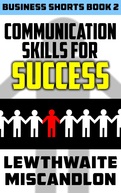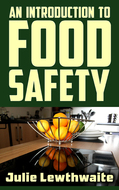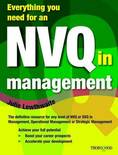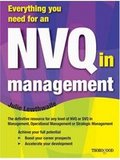Communication Skills for Success (Business Shorts Book 2)

by Julie Lewthwaite & Steven Miscandlon (2012)
‘Communication Skills for Success’ provides a comprehensive set of tools and techniques that will help you to get your point across in every situation, covering topics such as questioning and listening, reading body language, and business writing skills, as well as including invaluable advice on how to achieve results through meetings and negotiation.
Anyone who works in business will find value in the information contained in this book; however it is particularly suited to those entering supervisory or management positions for the first time. You will find the book full of useful frameworks and practical advice that will help you to succeed in your business communication, from day-to-day tasks such as handling telephone calls to delivering effective presentations.
‘Communication Skills for Success’ is the second book in the Business Shorts series.
‘Communication Skills for Success’ provides a comprehensive set of tools and techniques that will help you to get your point across in every situation, covering topics such as questioning and listening, reading body language, and business writing skills, as well as including invaluable advice on how to achieve results through meetings and negotiation.
Anyone who works in business will find value in the information contained in this book; however it is particularly suited to those entering supervisory or management positions for the first time. You will find the book full of useful frameworks and practical advice that will help you to succeed in your business communication, from day-to-day tasks such as handling telephone calls to delivering effective presentations.
‘Communication Skills for Success’ is the second book in the Business Shorts series.
Getting Things Done in Business (Business Shorts Book 1)

by Julie Lewthwaite & Steven Miscandlon (2012)
People who are successful in business rarely get where they are by luck alone. The best workers and managers — at whatever level — achieve success by developing their knowledge, skills and abilities in the right directions. By taking a structured approach to both your personal development, and the way you approach tasks in the workplace, you can improve your efficiency and effectiveness, as well as your career prospects.
‘Getting Things Done in Business’ provides a comprehensive set of tools and techniques that will help you succeed in business, covering topics such as managing business relationships, time management, decision making and project planning, as well as including invaluable advice on how to achieve results through effective teamwork. Anyone who works in business will find value in the information contained in this book; however it is particularly suited to those entering supervisory or management positions for the first time.
People who are successful in business rarely get where they are by luck alone. The best workers and managers — at whatever level — achieve success by developing their knowledge, skills and abilities in the right directions. By taking a structured approach to both your personal development, and the way you approach tasks in the workplace, you can improve your efficiency and effectiveness, as well as your career prospects.
‘Getting Things Done in Business’ provides a comprehensive set of tools and techniques that will help you succeed in business, covering topics such as managing business relationships, time management, decision making and project planning, as well as including invaluable advice on how to achieve results through effective teamwork. Anyone who works in business will find value in the information contained in this book; however it is particularly suited to those entering supervisory or management positions for the first time.
An Introduction to Food Safety

by Julie Lewthwaite (2012)
An Introduction to Food Safety has been written for people who are preparing and serving food in catering businesses such as pubs, restaurants, cafes, and takeaways. Working as a food handler is an extremely responsible job: everything food handlers do, or in some cases, don’t do, while they are busy preparing and/or serving food to people can have a direct impact on their health.
The workbook takes a step by step approach to food handling instruction. It contains six sections, each looking at a different aspect of food safety management. The sections are: 1. Basic principles of food safety in catering, 2. Food safety hazards, 3. Storing and holding food safely, 4. Cleanliness and hygiene, 5. Suitable food premises, 6. Legal requirements and the consequences of failing to meet them.
A set of questions at the end of each section helps the reader to review what they have learned. (The answers are at the back of the workbook.) Anyone working towards a qualification in food safety in catering, will find the workbook helps with that.
An Introduction to Food Safety has been written for people who are preparing and serving food in catering businesses such as pubs, restaurants, cafes, and takeaways. Working as a food handler is an extremely responsible job: everything food handlers do, or in some cases, don’t do, while they are busy preparing and/or serving food to people can have a direct impact on their health.
The workbook takes a step by step approach to food handling instruction. It contains six sections, each looking at a different aspect of food safety management. The sections are: 1. Basic principles of food safety in catering, 2. Food safety hazards, 3. Storing and holding food safely, 4. Cleanliness and hygiene, 5. Suitable food premises, 6. Legal requirements and the consequences of failing to meet them.
A set of questions at the end of each section helps the reader to review what they have learned. (The answers are at the back of the workbook.) Anyone working towards a qualification in food safety in catering, will find the workbook helps with that.
A Landlord's Guide to Letting

by Steven Miscandlon (2012)
Regardless of whether you are an experienced landlord, or taking your first steps in the world of UK property letting, it can be a complicated business. It’s important to understand your rights and obligations, how to manage the financial side of letting, and the finer points of maintaining a let property and dealing with tenants. The aim of this book is to provide a concise but informative guide to the things you’ll need to know and understand; finding a property, Buy to Let mortgages, tenancy agreements, deposit schemes, dealing with problem tenants and more. You’ll find it all in this guide, plus helpful hints and tips relating to many different aspects of buying a property and letting it out.
A Landlord’s Guide to Letting consists of a number of guides and articles that originally written at the end of 2011 for publication online. Part One is intended as an overall guide and summary of the main things you need to know about letting a property in England and Wales, while Part Two comprises a series of individual articles on a variety of letting-related topics.
Regardless of whether you are an experienced landlord, or taking your first steps in the world of UK property letting, it can be a complicated business. It’s important to understand your rights and obligations, how to manage the financial side of letting, and the finer points of maintaining a let property and dealing with tenants. The aim of this book is to provide a concise but informative guide to the things you’ll need to know and understand; finding a property, Buy to Let mortgages, tenancy agreements, deposit schemes, dealing with problem tenants and more. You’ll find it all in this guide, plus helpful hints and tips relating to many different aspects of buying a property and letting it out.
A Landlord’s Guide to Letting consists of a number of guides and articles that originally written at the end of 2011 for publication online. Part One is intended as an overall guide and summary of the main things you need to know about letting a property in England and Wales, while Part Two comprises a series of individual articles on a variety of letting-related topics.
Everything You Need for an NVQ in Management (2nd Edition)

by Julie Lewthwaite, edited by Steven Miscandlon (2010)
All the relevant management techniques and principles are explained in a clear, practical style, structured around the recently revised National Occupational Standards for Management and Leadership. Everything You Need for an NVQ in Management is also an extremely useful and comprehensive encyclopaedia of management techniques and principles for those not wanting to gain a qualification. It is written specifically for supervisors and junior managers, middle managers and senior managers working within medium and large organisations who wish to increase their knowledge and understanding of business and further their careers, whether or not they are working towards a specific qualification. It would also prove useful to those running and working in small businesses and to business studies students at all levels.
All the relevant management techniques and principles are explained in a clear, practical style, structured around the recently revised National Occupational Standards for Management and Leadership. Everything You Need for an NVQ in Management is also an extremely useful and comprehensive encyclopaedia of management techniques and principles for those not wanting to gain a qualification. It is written specifically for supervisors and junior managers, middle managers and senior managers working within medium and large organisations who wish to increase their knowledge and understanding of business and further their careers, whether or not they are working towards a specific qualification. It would also prove useful to those running and working in small businesses and to business studies students at all levels.
Managing People for the First Time

by Julie Lewthwaite (2006)
This is a fully updated version of a highly successful title, by the author of the best-selling Everything You Need for an NVQ in Management.
People in all types of organisation – business, professional, governmental, academic – have to make the critical leap to managing people for the first time. There are countless books on managing people but very little written from the perspective of the novice, someone faced with the daunting task of changing from following instructions to giving them. First published by Pitman, the book instantly caught on and was widely adopted in businesses and in particular the public sector. It has now been fully updated and revised to reflect recent changes in theory and practice.
This is a fully updated version of a highly successful title, by the author of the best-selling Everything You Need for an NVQ in Management.
People in all types of organisation – business, professional, governmental, academic – have to make the critical leap to managing people for the first time. There are countless books on managing people but very little written from the perspective of the novice, someone faced with the daunting task of changing from following instructions to giving them. First published by Pitman, the book instantly caught on and was widely adopted in businesses and in particular the public sector. It has now been fully updated and revised to reflect recent changes in theory and practice.
Negotiate to Succeed

Edited by Julie Lewthwaite (2000)
Modern business relies on the ability to reach mutually beneficial agreements. You need the skills to plan, deliver and follow through on negotiations. This book provides accessible, practical guidance and techniques for negotiating, including:
Modern business relies on the ability to reach mutually beneficial agreements. You need the skills to plan, deliver and follow through on negotiations. This book provides accessible, practical guidance and techniques for negotiating, including:
- Useful skills for the negotiator
- Dealing with ‘people issues’
- Negotiation in practice.
Everything You Need for an NVQ in Management (1st Edition)

by Julie Lewthwaite (2000)
Provides everything you need to compile a portfolio of evidence and achieve any level of management NVQ or SVQ. This text provides an introduction to NVQs and explains all the relevant management techniques and principles in a clear, practical style, structured around the national standards.
(Now out of print.)
Provides everything you need to compile a portfolio of evidence and achieve any level of management NVQ or SVQ. This text provides an introduction to NVQs and explains all the relevant management techniques and principles in a clear, practical style, structured around the national standards.
(Now out of print.)

